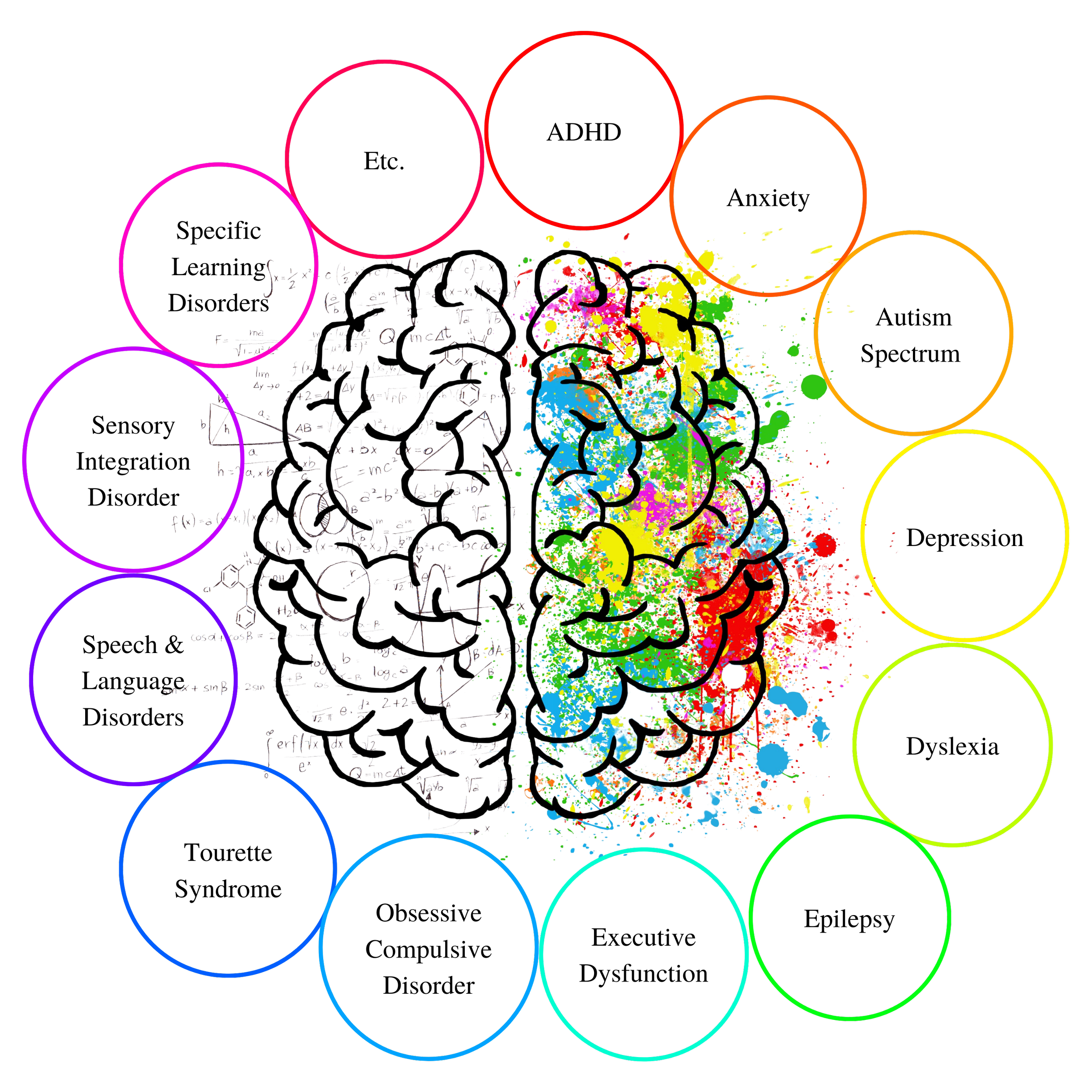What is Neurodiversity?
Neurodiversity can relate to a wide arrange of diagnoses.
(Image Credit: Elana Kanter, 2022)
According to Harvard Medical School, “Neurodiversity describes the idea that people experience and interact with the world around them in many different ways; there is no one "right" way of thinking, learning, and behaving, and differences are not viewed as deficits.” While neurodiversity has been associated with Autism Spectrum (ASD) and Attention Deficit Hyperactivity Disorder (ADHD), it expands these diagnoses.
Australian sociologist, Judy Singer, is noted among the start of coining the neurodiversity word and associated movement. “Singer saw neurodiversity as a social justice movement, to promote equality of what she called “neurological minorities” — people whose brains work in atypical ways” (Child Mind Institute). Neurodiversity as a social justice movement has spanned social media as well; there are accounts and hashtags promoting pride for neurodivergence.
Neurodiversity is a Strength
“Singer felt that these differences should not be viewed as deficits, but rather as normal and potentially valuable variations on the way brains work” (Child Mind Institute). The variations on the way a neurodivergent person’s brain works can be an asset to them as a learner or employee. According to the Bangkok Post, “Neurodiverse employees are a staggering 30% to 50% more productive than neurotypical people (Harvard Business Review, JPMorgan). This is due to our ability to learn very quickly, and work to our strengths. Being productive is down to our creativity, insight and incredible problem-solving skills.”
Neurodivergence is an asset across aspects of life. “Their unique thinking styles, coping strategies, and life experiences can lead to public services innovation” (Houdek). Help all your students and employees - neurodiverse and neurotypical - discover their strengths. You can use personality assessments and learning style inventories as a starting place. Also, provide opportunities for self-reflection and observation in different settings. Kanter Coaching can also help you find and utilize your strengths.
Embracing Neurodivergence
Here are some tips on embracing your neurodivergence:
Get to know yourself! Learn more about your neurology, personality, learning styles, and passions.
Join a local group to find like-minded and neurologically similar individuals to connect with and learn from.
Find heros! Lots of successful people are neurodivergent!
Show love to yourself. Try journaling daily about your gratitude and things you love about yourself.
Surround yourself with a positive, loving, supportive community.
How Can Kanter Coaching Help You?
Coaching can help you:
Understand your neurology.
Understand your strengths & how to utilize them in work/school.
Build a toolbox to address your areas of challenge.
Understand school and workplace accommodations.
Build self-confidence and advocacy skills.
References
Austin, R. D., & Pisano, G. P. (2017). Neurodiversity as a competitive advantage. Harvard Business Review, 95(3), 96-103.
Baumer, N., & Frueh, J. (2021, November 23). What is neurodiversity? Harvard Health. Retrieved from https://www.health.harvard.edu/blog/what-is-neurodiversity-202111232645
Houdek, P. (2022). Neurodiversity in (Not Only) Public Organizations: An Untapped Opportunity?. Administration & Society, 00953997211069915.
Miller, C. (2022, April 19). What is neurodiversity? Child Mind Institute. Retrieved from https://childmind.org/article/what-is-neurodiversity/
Morgan-Trimmer, R. (2020, August 20). What is neurodiversity and why should you care about it? Bangkok Post. Retrieved from https://www.bangkokpost.com/life/social-and-lifestyle/1971675/what-is-neurodiversity-and-why-should-you-care-about-it-
Rentenbach, B., Prislovsky, L., & Gabriel, R. (2017). Valuing differences: Neurodiversity in the classroom. Phi Delta Kappan, 98(8), 59-63.

